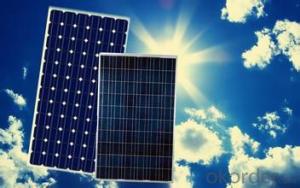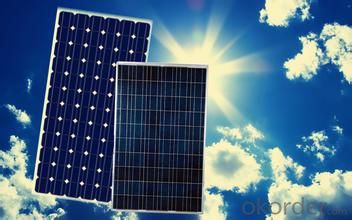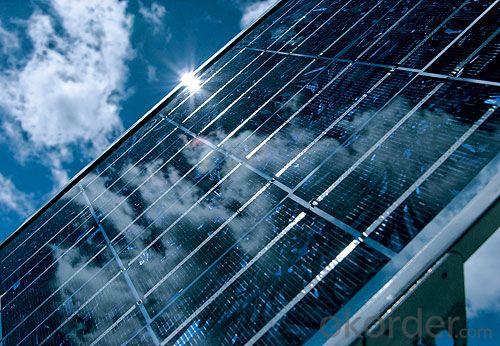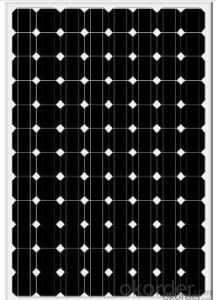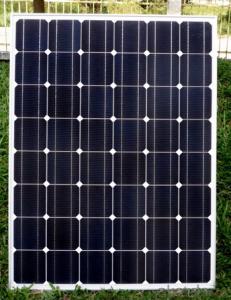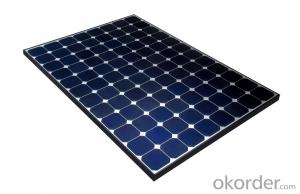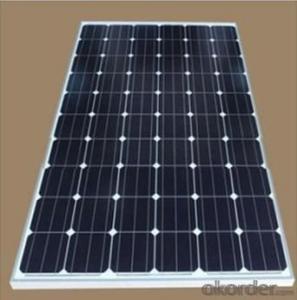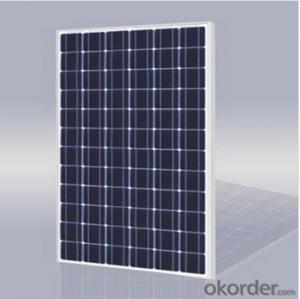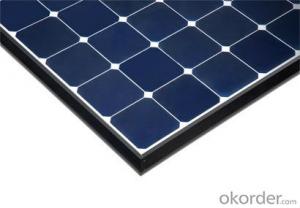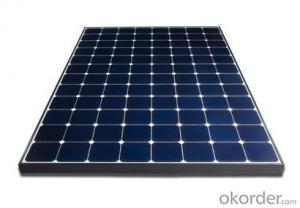100w CNBM Monocrystalline Silicon Solar Energy Solar Panels for Home Use
- Loading Port:
- Tianjin
- Payment Terms:
- TT OR LC
- Min Order Qty:
- 100 watt
- Supply Capability:
- 1000 watt/month
OKorder Service Pledge
OKorder Financial Service
You Might Also Like
Specification
100W CNBM Monocrystalline Silicon Panel for Home Using
Production description
Emerging, third generation solar technologies use advanced thin-film cells. They produce a relatively high-efficiency conversion for the low cost compared to other solar technologies. Also, high-cost, high-efficiency, and close-packed rectangular multi-junction (MJ) cells are preferably used in solar panels on spacecraft, as they offer the highest ratio of generated power per kilogram lifted into space. MJ-cells are compound semiconductors and made of gallium arsenide (GaAs) and other semiconductor materials. Another emerging PV technology using MJ-cells is concentrator photovoltaics (CPV).
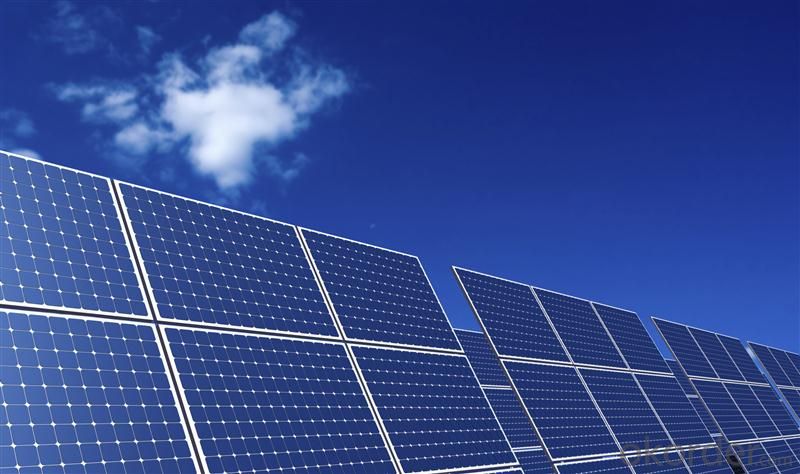
Feature
1.High conversion efficiencies resulting in superior power output performance.
2.Outstanding power output even in low light or high temperature conditions
3.Optimized design for ease of soldering and lamination
4.Long-term stability,reliability and performance
5.Low breakage rate
6.Color uniformaity
Physical characteristic
1. Rigorous quality control meets the highest international standards.
2. High-transmissivity low-iron tempered glass, strong aluminium frame.
3. Using UV-resistant silicon.
4. IS09001/14001/CE/TUV/UL
- Q: they are pretty expensive. So does it save you money on electricity in the long run? How easy is it to connect solar panels to your house?
- yes. Its pretty simple connection. It does save money on electricity.
- Q: So, I've seen cheap solar panel kits for sale from Harbor Freight, and regardless of whether or not I were to buy a set from them or someone else, I was wondering what the process of implementing a small-scale solar system into your household electrical system would be.I've read articles that started out too in-depth or were speaking of systems on a much larger scale.Can it be as easy as buying the panels and inverter, and plugging it into a socket, or is there more to it?Some of the articles I was reading had mentioned having to contract with your electrical supplier, having to have an electrician tie it all in in some special/ necessary way, using a battery pack (would this be necessary for a tied-in system?), or using the system to only power single items, like a water heater, or plugging items into a connected battery-pack, all of which I'm not sure is necessary or needed for what my goals/ means are/ would be.
- Solar panel produces DC power that cannot be used directly by any electric device at house. Besides, it produces very little current unless its size is big as your roof. To convert DC power into AC power requires even more investment, like a huge storage rechargeable battery bank and very high power DC to AC converter . That is not worth to try it to supply whole house electricity with solar power . That might cost you at least U$20,000 to start with and never ended weekly maintenance. You could only try it just for fun to let it light up a few LED directly without the need to add any extra parts to it.
- Q: I have seen DIY software which explains everything for novices. Specifically, how to build your own solar panels and tie them into your home electrical system for about $00 in parts.Has anyone tried doing this? Was it easy?
- Hi Mitch, Yes they are legitimate ans so much so the government will actually help you pay for them. Someone has already mentioned if you purchase them from your local solar panel installer they will not be cheap.They have come down in price a lot over the last couple of years. Yes you can build your own and no its not too difficult.You need to know in your own mind whether you just want to reduce your utility bill or come off the grid completly. The best solution is a combination of wind and solar power and yes you can build your own windmill as well and at the bottom her I will show you where to go to get easy non technical plans. Naturally the sun does not shine at night so your solar panels would not work then but windmills function 24/7 as long as there is wind. If you have nearby neigbours please be aware windmills do make some noise which might upset your neighbours and of course see if you need planning permission from the town. The solar panel plans show you how to set an 80w solar panel which of course would not be able to power your whole house,but once you have built one why not build loads more and each one will get easier to build. Wish you all the best.
- Q: I don't have a regulator connected as they are a little expensive for a pensioner, If I join the panels into line to the battery bank from the roof should that be OK.?
- I am pretty darn sure you need the regulator because all the advertising says that you must have one if you have more than one small solar panel. I think you can overcharge your batteries otherwise. Solar power is still not cost effective, so most people have solar power because they care about the environment more than they care about expenses. If you are poor, it is better to skip solar power, unless you are in an area where there isn't access to electricity. For example, we have a cabin without electricity. I am a strong environmentalist, too. Solar power is too expensive still, for low income people. It is better to focus on energy conservation, imo. such as change your roof to white, to save on A/C, as the head of the US energy dept. says (he is a nobel prize winning physicist). PS Dave might be right on that stuff, i don't know. but all the ads say you need a regulator if you are going to have more than one solar panel so I assumed this was due to risk of overcharging.
- Q: I want to build a Solar Panel at home.Where can I find possibilities for Selfmade Solar Panels
- Did okorder / . It might surely benefit anyone!
- Q: Are solar panels suitable for all climates?
- Solar panels are suitable for a wide range of climates, but their efficiency may vary depending on the amount of sunlight available. While they can still generate electricity in cloudy or colder regions, they perform best in areas with high solar insolation and minimal shading. Advances in technology have made solar panels more adaptable, allowing them to be utilized effectively in various climates around the world.
- Q: i need to make a solar panel model for a project in science and i would like to know how to build a easy model at home that wont cost alot
- There are different types of solar panels. Photovoltaic for electricity, and thermal for heating water, and passive for heating air. So it would help if you would say what type you are going to build. Theere are a lot of videos on you tube on how to make solar panels. use the link below.
- Q: Can solar panels be installed on the ground instead of a roof?
- Yes, solar panels can be installed on the ground instead of a roof. Ground-mounted solar panels are a popular option for those who do not have suitable roof space or prefer not to install them on their roofs. Ground installations offer flexibility in terms of panel orientation and can potentially generate more electricity due to optimal sun exposure.
- Q: i want to how i make solar panels
- DIY okorder
- Q: I'm trying to charge rechargeable AA batteries with a solar panel. What gauge wire should I use to connect the panel to the batteries? I know I'm not going to have a lot of current going through so the wire size doesn't really matter. Can the wire be too thick thoShould I ugh? Should I use a diode to keep the batteries from overpowering the circuit? If so, what size diode? My panel is 4.8V 50mA. Can I just hook the panel straight into the batteries or do I need something else?
- In order: .? Just about any wire will do.? You can handle 50 mA over just about anything, even 28 gauge telephone wire.? Your biggest problems are probably going to be mechanical stress (you want stranded wire instead of solid, to avoid breakage) and dealing with the size of larger wires. 8 gauge speaker wire may be a good optimum. 2.? You need a diode.? If you're charging NiMH or NiCd cells you're going to have about .25 volts/cell; you can charge up to 3 of them in series with a 4.8 volt panel.? The solar panel is a bunch of diodes itself, but they're leaky in the reverse direction; the diode prevents the batteries from discharging themselves back through the panel.? You want a Schottky-barrier diode, because the forward voltage drop is about 0.2 volts instead of 0.7 volts for a regular silicon rectifier.? This gives you maximum current output from your panel.
Send your message to us
100w CNBM Monocrystalline Silicon Solar Energy Solar Panels for Home Use
- Loading Port:
- Tianjin
- Payment Terms:
- TT OR LC
- Min Order Qty:
- 100 watt
- Supply Capability:
- 1000 watt/month
OKorder Service Pledge
OKorder Financial Service
Similar products
Hot products
Hot Searches
Related keywords
